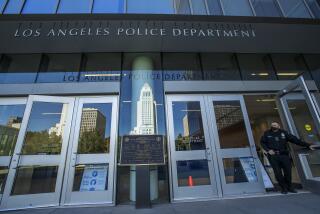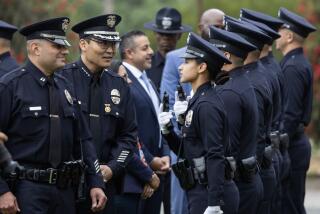Tiny Turnout for Protest at LAPD
- Share via
With new details of Los Angeles’ police corruption scandal emerging almost daily, activist Roger Eaton was eager to join what he hoped would be a large number of outraged citizens demonstrating at LAPD headquarters Saturday.
But despite extensive e-mail announcements and word-of-mouth publicity, the demonstration planned by the newly formed Coalition for Police Accountability drew just 15 participants.
As leaders conferred outside Parker Center, just steps away from a monolithic fountain memorializing slain officers, Eaton and others puzzled over the seeming lack of public interest in the unfolding scandal.
“You have to wonder,” said Eaton, a member of a group called A Season for Nonviolence L.A. “After what’s happened over the past few weeks, why are there only 15 people here?”
Leaders of the coalition, who are calling for an independent, civilian investigation of the Los Angeles Police Department, were mostly at a loss to explain the public’s reticence.
However, some said the answer is rooted in the city’s sprawling geography, its class divisions and its history of racial conflict. They said too that the lack of street protests did not necessarily translate into lack of anger.
“Just because you don’t see people demonstrating doesn’t mean people aren’t upset,” said Donald Cook of the group Police Watch. He said that because the alleged Rampart police abuses involved African Americans and Latinos who were not wealthy, the response among those groups was subdued.
“I think the attitude of a lot of blacks and browns in this city is: So what else is new? We’ve known about this sort of thing for years.”
The scandal centers on accusations that officers in a special anti-gang unit in the LAPD’s Rampart Division shot and framed suspects, perjured themselves and conspired with other government agencies to deport suspected gang members.
The Coalition for Police Accountability comprises 49 activist groups. On Saturday, representatives from some of those organizations agreed that Angelenos appeared to take a more passive view of the LAPD scandal than their counterparts in New York, who recently filled city streets to protest the acquittal of four police officers in the fatal shooting of an unarmed West African immigrant.
“One of the reasons you don’t see that here is because L.A.’s so spread out,” said Shawn McDougal of the American Friends Service Committee, a Quaker group. “In New York, everyone is living right on top of each other. You can have 10 stories of people come out for an event in front of their building.”
Still other LAPD critics said that class is a factor as well. Had police abuses occurred in a wealthy area, where residents might be more prone to press city officials for action, the reaction would have been stronger, said Mario Tafur of Amnesty International.
Residents with lower incomes, such as those in the Rampart district, lack a similar sense of entitlement, he added.
Lastly, some demonstrators said the Rampart victims inspired little sympathy. “Some people say they needn’t extend the full protection of the law to these people because, after all, they’re just a drug user, they’re just a gang member, and who gives a damn about them anyway?” Cook said.
More to Read
Sign up for Essential California
The most important California stories and recommendations in your inbox every morning.
You may occasionally receive promotional content from the Los Angeles Times.














